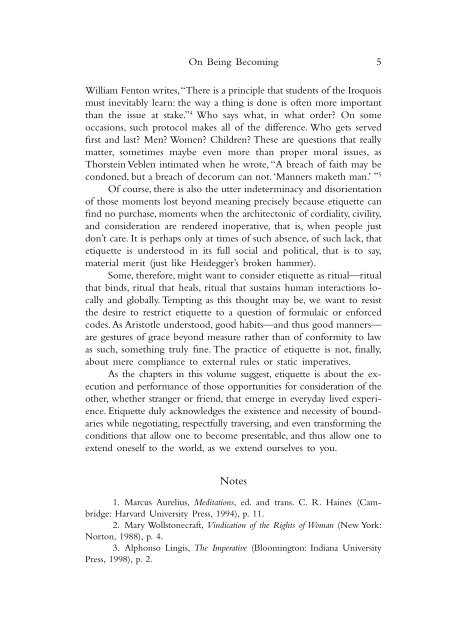You also want an ePaper? Increase the reach of your titles
YUMPU automatically turns print PDFs into web optimized ePapers that Google loves.
On Being Becoming<br />
William Fenton writes, “There is a principle that students <strong>of</strong> <strong>the</strong> Iroquois<br />
must inevitably learn: <strong>the</strong> way a thing is done is <strong>of</strong>ten more important<br />
than <strong>the</strong> issue at stake.” 4 Who says what, in what order? On some<br />
occasions, such protocol makes all <strong>of</strong> <strong>the</strong> difference. Who gets served<br />
first and last? Men? Women? Children? These are questions that really<br />
matter, sometimes maybe even more than proper moral issues, as<br />
Thorstein Veblen intimated when he wrote, “A breach <strong>of</strong> faith may be<br />
condoned, but a breach <strong>of</strong> decorum can not. ‘Manners maketh man.’ ” 5<br />
Of course, <strong>the</strong>re is also <strong>the</strong> utter indeterminacy and disorientation<br />
<strong>of</strong> those moments lost beyond meaning precisely because etiquette can<br />
find no purchase, moments when <strong>the</strong> architectonic <strong>of</strong> cordiality, civility,<br />
and consideration are rendered inoperative, that is, when people just<br />
don’t care. It is perhaps only at times <strong>of</strong> such absence, <strong>of</strong> such lack, that<br />
etiquette is understood in its full social and political, that is to say,<br />
material merit (just like Heidegger’s broken hammer).<br />
Some, <strong>the</strong>refore, might want to consider etiquette as ritual—ritual<br />
that binds, ritual that heals, ritual that sustains human interactions locally<br />
and globally. Tempting as this thought may be, we want to resist<br />
<strong>the</strong> desire to restrict etiquette to a question <strong>of</strong> formulaic or enforced<br />
codes. As Aristotle understood, good habits—and thus good manners—<br />
are gestures <strong>of</strong> grace beyond measure ra<strong>the</strong>r than <strong>of</strong> conformity to law<br />
as such, something truly fine. The practice <strong>of</strong> etiquette is not, finally,<br />
about mere compliance to external rules or static imperatives.<br />
As <strong>the</strong> chapters in this volume suggest, etiquette is about <strong>the</strong> execution<br />
and performance <strong>of</strong> those opportunities for consideration <strong>of</strong> <strong>the</strong><br />
o<strong>the</strong>r, whe<strong>the</strong>r stranger or friend, that emerge in everyday lived experience.<br />
Etiquette duly acknowledges <strong>the</strong> existence and necessity <strong>of</strong> boundaries<br />
while negotiating, respectfully traversing, and even transforming <strong>the</strong><br />
conditions that allow one to become presentable, and thus allow one to<br />
extend oneself to <strong>the</strong> world, as we extend ourselves to you.<br />
Notes<br />
1. Marcus Aurelius, Meditations, ed. and trans. C. R. Haines (Cambridge:<br />
Harvard University Press, 1994), p. 11.<br />
2. Mary Wollstonecraft, Vindication <strong>of</strong> <strong>the</strong> Rights <strong>of</strong> Woman (New York:<br />
Norton, 1988), p. 4.<br />
3. Alphonso Lingis, The Imperative (Bloomington: Indiana University<br />
Press, 1998), p. 2.<br />
5
















